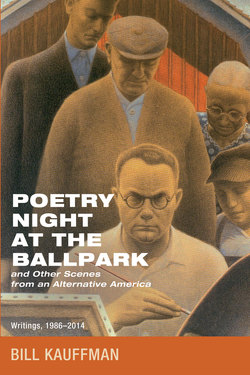Читать книгу Poetry Night at the Ballpark and Other Scenes from an Alternative America - Bill Kauffman - Страница 10
На сайте Литреса книга снята с продажи.
Bill Kauffman Night at the Ballpark
ОглавлениеThe American Conservative, 2008
When in May Batavia Muckdogs general manager Dave Wellenzohn told me that as club vice president and resident minor-league baseball litterateur I was to be honored with “Bill Kauffman Day,” I replied, gamely if lamely, “Every day is Bill Kauffman Day.”
To my horror, the schedule soon appeared with the September 4 game so denominated. For three months I prayed for a rainout—unavailingly. For as grateful as I was to Dave, no one with even a partially functioning nimrod detector can fail to be humiliated by such a day.
“What are you going to do on Bill Kauffman Day?” I heard all summer long. Bobbleheads were out, not because they’re infra dig but rather too expensive. I knew I couldn’t follow through on my threat to take the field and read from my collected works in a fake-English accent as a homonymic nod to Andy Kaufman. Throwing out the first pitch was mandatory: Friends placed wagers on whether I’d reach the plate. (Bets were off in the event of a “strong wind.”)
Brian Paris, coconspirator in last year’s Baseball Poetry Night, was manning the p.a. system for the last days of the season. For Bill Kauffman Day I urged an Americana diet of Townes Van Zandt, Lucinda Williams, Tom Russell, and the local Ghost Riders, the best unsigned country band in America, but Brian played Michael Buble. Oh well; he’s still Mr. Irrepressible of Batavia baseball.
Serves me right, anyway. I am a chronic critic of the blaring of amplified music and sound effects during games. My friend Tom Williams and I want someday to sponsor a “Pastoral Night” in which the only sounds are ball hitting glove, bat hitting ball, umpiric declarations, and the sweet buzz of friends talking in the bleachers and grandstand.
Brian kicked off BK Day with a reprise of my disastrous oration of Bukowski’s “Betting on the Muse,” which begins “Jimmie Foxx died an alcoholic in a skidrow hotel room.” I thought of it as a cautionary tale for the boys.
Dave called me onto the field and out I shambled, wondering, during his funny and much-appreciated encomium, if I should pitch from the stretch or full windup.
Between innings we gave away copies of my books to those who answered questions about Batavia baseball history. I feared that folks would answer the questions but then spurn the prizes. I’d find books littering the stands like dehiscent peanut shells. But neighbors act neighborly.
Gretel and her friend Megan sang the national anthem mellifluously. During the seventh-inning stretch, now unfortunately scored in so many ballparks by that empty cloud of bombast “God Bless America,” the girls ignored post-9/11 protocol and instead sang my favorite, “America the Beautiful.”
Gretel and Megan weren’t past “Oh beautiful . . .” when a heckler started in from the beer deck: “Wrong song! Wrong song!” The girls got a huge kick out of it. How many singers have ever been jeered during “America the Beautiful”?
The Muckdogs lost, 13–4. Maybe Bukowski’s derelict warning induced a dugout-wide fit of melancholia. Aptly, I suppose, the go-ahead run was allowed by our favorite Muckdog, a sidearm reliever who lists his hobbies as “reading and poetry.” (The commonest avocation among the boys is “video games.”) Brian wisely ignored my request to play “Knockin’ on Heaven’s Door” in the bottom of the ninth.
About that first pitch. After telling the crowd that my brother had promised to buy everyone in the stands a beer if I didn’t throw a strike, I threw a fastball right down the pipe. I thought the radar gun clocked it in the low eighties—others estimated the mid-forties. My brother bought me a Rohrbach’s, and my cousin laughed out a memory of how as kids we’d sneak into Dwyer after church and my dad would pitch us ball after ball. Almost forty years later this little stadium is still larger than all my imaginings.
